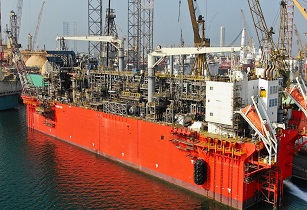In the presence of Bruno Jean Richard Itoua, Minister of Hydrocarbons of the Republic of the Congo; Maixent Raoul Ominga, managing director of SNPC, and Guido Brusco, Eni’s chief operating officer-natural resources, Eni celebrated the sail away of the Tango Floating Liquefied Natural Gas (FLNG) and Excalibur Floating Storage Unit (FSU) vessels from Dubai to Congo’s offshore
The milestone aligns with the timeline of the Congo LNG project, whose first phase will startup in December 2023. The project will reach approximately 4.5 bn cu/m per annum of gas liquefaction capacity at plateau.
Tango FLNG, which has a liquefaction capacity of approximately 1 bn cu/m per annum of gas, will be moored 3 kms offshore along with the Excalibur FSU vessel upon their arrival in Congo.
The Congo LNG project leverages Marine XII gas resources and existing production facilities in a new, phased approach that will allow to reach approximately 4.5 bn cu/m per annum of gas liquefaction capacity at plateau, as well as zero routine gas flaring. A second FLNG vessel with a capacity of approximately 3.5 bn cu/m per annum of gas is under construction and will begin production in 2025.
The project will help the Republic of the Congo meet its energy needs while seizing the opportunity to exploit surplus gas through LNG production, allowing the country to join the group of global exporters of LNG in record time. According to the agreements recently signed, all LNG produced will be marketed by Eni.
Eni has been operating in Congo for more than 50 years and is the only company active in the development of the country’s gas resources. It currently supplies gas to Congo Electric Power Station (CEC), which accounts for 70% of the country's power production capacity. It is strongly committed to promoting the energy transition in the country. Among other initiatives, the Oyo Center of Excellence for Renewable Energy and Energy Efficiency was recently handed over to the Ministry of Higher Education, Scientific Research and Technological Innovation, which will manage it together with UNIDO (United Nations Industrial Development Organization). Furthermore, the company is developing agri-feedstock production projects that do not compete with the food supply chain, and whose produce will help feed Eni’s biorefineries.





